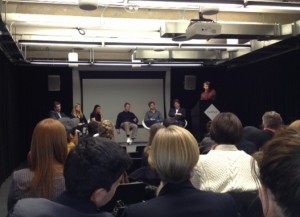
Alex Aldridge of Legal Cheek hosted a well-attended panel discussion around the future for young lawyers on December 5th. Whether people were drawn by the varied panel or the exciting venue (Google Campus in Tech City) or like me, a combination of the two, remains to be seen, but the emphasis on technology made it an enjoyable evening.
Panel members included:
Jonathan Rose from Artesian Law
Jill Marshall, City lawyer turned academic at Queen Mary, University of London
Susan Cooper, founder of Accutrainee
Jonathan Lea, solicitor specialising in advising tech start-ups
Adam Wagner, Barrister at One Crown Office Row and founder of the UK Human Rights Blog
David Allen Green, media lawyer and legal correspondent of the New Statesman
The event kicked off with David Allen Green telling the audience how blogging changed his life, transforming him from a ‘journeyman lawyer’. Most know of the beginnings of David’s blogging ascent; starting up a blog he named ‘Jack of Kent‘ after a folklore hero, David’s posts attracted a couple of hits a day until he began writing about libel law. He spoke of the Simon Singh case as the touch paper – a case which would have only attracted a couple of lines in The Telegraph’s Mandrake column previously. David, inspired by science writers, wrote about the law in a way that non-legal people could comprehend, adding links to the authorities he relied upon and opening up comments.
Adam Wagner likened young barristers to start-ups; stating that those who want to do well in chambers must see themselves as a small business and market themselves. A comment that if you don’t get yourself involved in big cases, you won’t get a role in big cases drew many nods of agreement. Wagner drew parallels between blogging and lawyerly skills: both source-based, quick and to-the-point presentation of the issues and an attempt to be objective. The UK Human Rights Blog is a fantastic source, as the two million hits illustrate and all for only £250 over 2 years!

Adam and David both spoke of their motivation in blogging to add something to the public debate that wouldn’t otherwise be there, bringing legal decisions into the political space, particularly when there are so few legal journalists out there.
Discussion moved onto the reduced overheads in new models of legal practice with Jonathan speaking about how his practice has done away with expensive premises. His documents are scanned onto the cloud by admin staff and he accesses them straight from his iPad.
Susan Cooper’s Accutrainee offers law graduates the opportunity to work at multiple locations for their training contract. She spoke of the inflexibility of the training contract model and how much upfront investment is required by firms.
Alex asked Jonathan Lea about his practice. Jonathan is now self-employed after previously working in association with Bargate Murray. His competition are the big firms like Pinsent Masons and Taylor Wessing, but he also draws attention to their overheads, speaking of how alien paying to speak to ask advice from someone face-to-face is, to those start-ups running web-based businesses. David Allen Green backed this up, stating that law is only attractive to these start-ups when they see the legal fees as being cheaper than the potential losses consequent from whatever they are seeking to protect.

Blogging again took centre stage and discussion moved onto the risks involved. Adam spoke of the minefield that comes with being an independent advocate trying to argue both sides of an argument – particularly tricky when you represent the government, as Adam has done frequently. He described his internal conflict around the Teresa May ‘Catgate‘ episode, deciding he must blog because he ‘had to be able to call out complete rubbish for the general public’. Adam noted how lots of civil servants read the UK Human Rights Law Blog and respect the fact that a line is not taken.
What was reassuring was that even these hugely influential bloggers get scared sometimes about being called out on a point – probably the one thing that prevents more young lawyers from getting involved.
Alex summed up the evening by describing the situation for young lawyers as “More broke but life’s more interesting”. What do they think I wonder?
